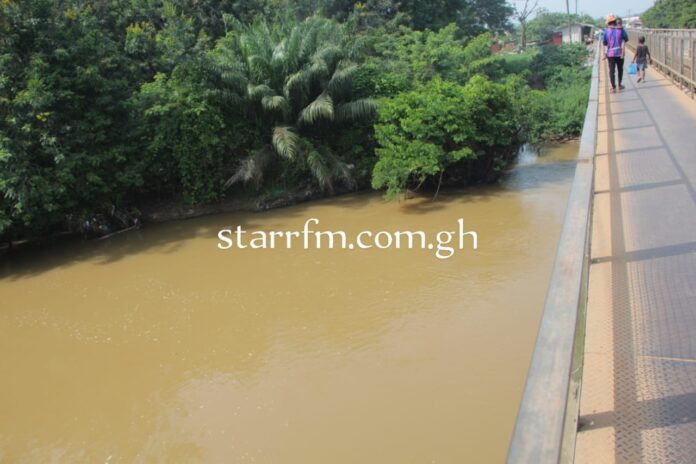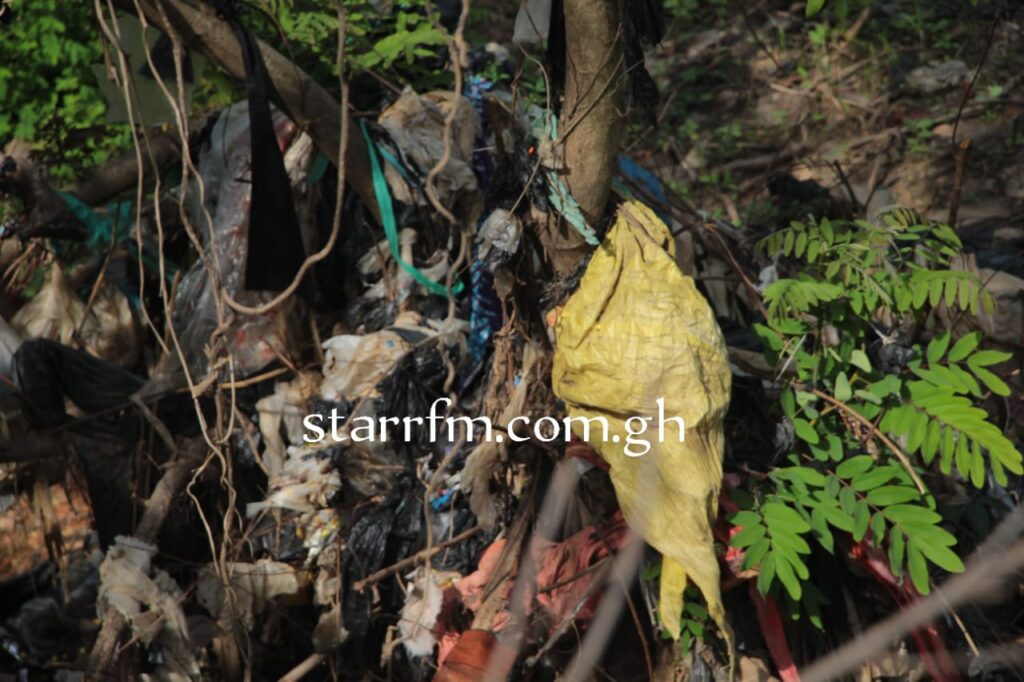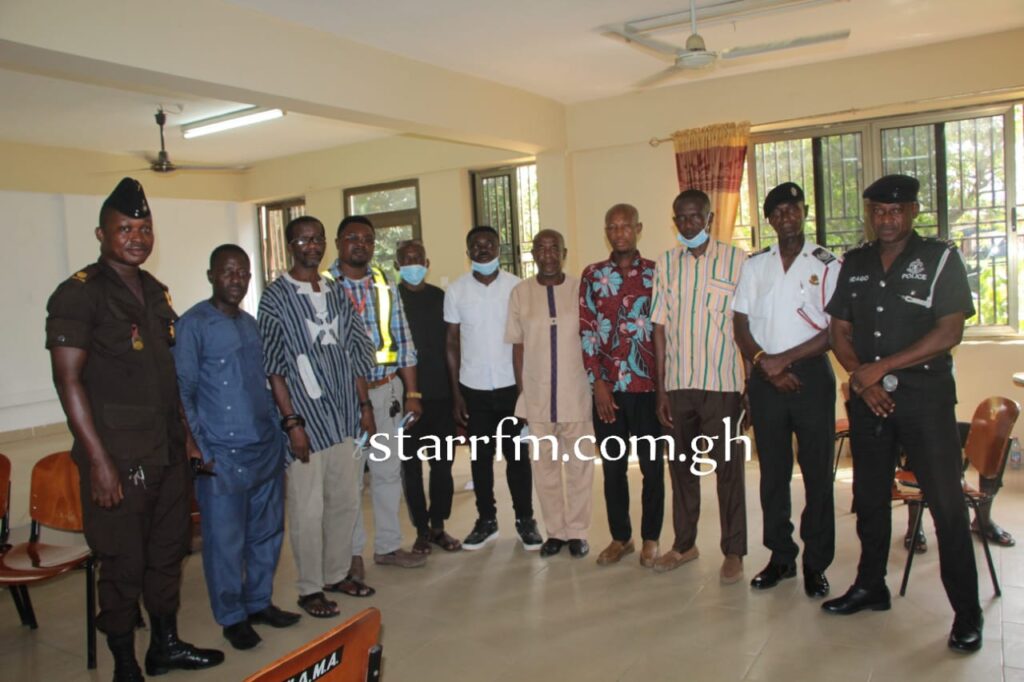
The Densu River is under serious threat from human activities in Nsawam and its environs.
Fecal matter from a public toilet facility near the river in the town is clandestinely discharged into the river whilst leachate from landfill at Fotobi community also contaminating the river.
Joseph Yaw Konnor, Assembly Member Yaw Edipa Essiaw Electoral Area,told Starr News” the landfill site is posing a lot of challenges to water bodies and people living in around the site.The leaching from the site you know most of the things they bring there decompose so it leaches.The leachate is very black and it gets into the Dobro river which joins the Densu river.The water body is polluted and even boreholes are polluted”.
Solid waste materials particularly plastics from activities at the Nsawam market and Lorry terminal end up in the river due to their proximity.
The plastic pollution is more visible during heavy downpour as the running water carries volumes of plastic from nearby dumping sites into the river.

Many weeks after downpour in the area, plastics could still be seen choked under the bridge over river Densu in Nsawam Township and trees at the banks of the river.
The river takes its source from the Atewa Range near Kibi and flows for 116 km into the Weija Reservoir before entering the Gulf of Guinea through the Densu Delta Ramsar Site. The mean annual runoff is 500×106 m3.
The Densu River Basin has an area of 2,490 km2 and spans 11 Local Government Assemblies in three regions (i.e. Central Region, Eastern Region and the Greater Accra Region).
According to the Water Resources Commission,there are about 200 settlements in the Basin and the total population is over 600,000, equivalent to 240 persons per km2. This figure is visibly far higher than the national average of about 100 persons per km2.
The Densu River serves over five million people with intakes of four treatment from the river in Koforidua, Apedwa, Nsawam and Weija.
At a stakeholders meeting organized by Nsawam based none governmental organization, Ark Development Organization (ADO) on the high level of pollution threatening quality and sustainability of the river, the Chief Basin Officer ,Water Resources Commission, Dr.Ronald Abraham,called for relocation of Nsawam Lorry terminal and market for re-engineering and protection of the river environment from pollution.
“Our forefathers when they were very limited number, set up their communities around water bodies .But it is about time as our population grows rapidly around here we give the water bodies space. So we must be happy to find space to relocate the market we should also find space to relocate the lorry station and any other activity around there. People are running toile facilities should be asked to take them off because what they do repeatedly is to pump the fecal matter into the stream but as u said earlier nature absorbs all these kind of things and by the time the river gets to Weija lake, it is clean.”

Dr. Ronald Abraham however said currently river Densu is not much threatened by activities of galamsey unlike other rivers but human activities along the basin including discharge of fecal matter and waste are serious concerns.
“The fortunate thing is that even if pollution enters say Nsawam by the time it reaches Ashalaja , natural cleansing occurs so we have clean water because all the time tributaries are injecting clean water diluting what has been polluted then plant on the way clean it”
He continued that “We are collaborating with the assembly and then the security agencies to ensure that sanity prevails. Ghanaians must also work out their recalcitrant situation.We should do the wrong thing with impunity. We do be doing community policing”.
The Executive Director of Ark Development Organization, Emmanuel Kwarfo Minta said the NGO has since 2010 been embarking on advocacy for the need to curb the growing pollution of river Densu but little has been done.
He emphasized the river has suffered serious pollution in recent years, resulting in discoloration of the river rendering it unsafe for direct consumption without treatment.
“A cursory tour along the river revealed some sources of the water pollution. Among them were the Landfill site at Fotobi, domestic and institutional sewage discharges channeled into the river, scrap depots sited close to the river, and overflow of refuse from refuse containers finding their way into the river. Apart from direct dumping of refuse in the river, toxic substances are washed from aforementioned places into the river when it rains”
He continued that “Since then, the organization has been monitoring the situation and has seen the need for timely actions to avert a major disaster which might come in the form of disease outbreak or water crisis. In conclusion, we are appealing to the duty bearers to take immediate actions to restore the Densu River to its past glory so as to make it pure for human consumption. So we thank the NLA for sponsoring this project”.
He said availability of safe water is very critical to human particularly for women and girls to maintain hygiene and undertake their economic empowerment activities.
Minta Kwarfo stressed safe drinking water has connection with achievement of many of the sustainable development goals hence the need to pay critical attention to protect fresh water bodies in the country.
Mr. Emmanuel Minta therefore said Ark Development Organization is implementing “Soccer for Sanitation Change” project which seeks to bring the youth and community leaders together to protect rivers in the area through awareness and behavioral change.
A committee has been formed in the regard.
Source: Ghana/Starrfm.com.gh/103.5FM/Kojo Ansah

